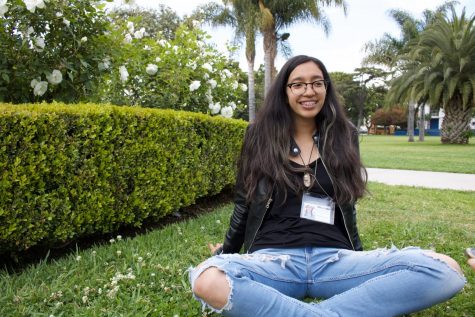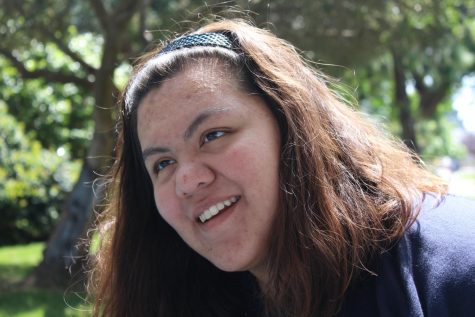Saying Goodbye to the Creators of Humans of Venice
June 2, 2019
Julissa Ventureno, senior

What are your goals in life?
“My goal in life is to save someone. That sounds super dramatic, but I just want to help at least one person. I want to study psychology in college and come back to communities like mine that are under-resourced, regarding mental health. I think that in communities like mine, mostly black and brown communities, or just minorities in general, mental health is kind of taboo. I’ve seen a lot of families suffer because of that and lose loved ones. That’s why I think my goal in life is to save at least one person and give them resources that can help them.”
Where do you see yourself in five years?
“I see myself probably working in a non-profit, I feel like non-profits really do help communities and kids who need help since there are a lot of people who just don’t give them enough support.”
What do you enjoy doing the most?
“I enjoy telling stories. I have a lot of platforms that help me tell stories like writing,
photography and videos.”
What are some challenges you have faced in the past?
“My status as an undocumented student caused a lot of challenges. My mom told me
when I was about five years old, and it shook my world, and I was like, ‘What’s that?’ I didn’t understand. Until middle school and high school, I started understanding it more. I had this whole dream that I was going to do cool stuff, the American dream basically. When I got the reality, I was like, ‘Wow, that’s going to suck.’ It made me go into this really dark space that no one should have to go through, and that leads to also what I want to help people with—mental illness. I struggled with depression and anxiety and suicidal thoughts. I was lucky because my friend kind of stopped me. In eighth grade, there was a day when I had a ‘plan’; my friend found the note, and she talked to the counselor. After that, I went into a really bad place, worse than the one I was in already. She (the friend) helped me find a non-profit that could help me. I feel like I was really affected by my undocumented status because I didn’t know there were resources out there that could help me.”
How has “Humans of Venice” has affected you?
“When I first started it with Alicia, it just opened my eyes to something that I already knew, because everybody always says, “You are not alone.” ‘Humans of Venice’ showed me that it’s true, that it is not just something that people say that is cliche. People aren’t really alone; some people have really similar stories. Even though Humans of Venice can sometimes be sad and depressing, it is really cool that a lot of people have similar stories and still persevere through all these challenges that they are going through. People we interview are really inspiring to me. They’re going through all that, and they still have a smile on their face? That is just really inspiring to me.”
What was the goal of creating “Humans of Venice”?
“We wanted to bring the school community closer, to show people the real side of others, to empathize with others’ stories and understand them.”
What advice would you give to others who may be going through similar situations?
“If you have big dreams and big goals, you have to be prepared for the challenges because there is going to be a lot. You just have to be prepared for them; even if you get knocked down, you still have to find something that gives you enough hope to get back up.”
Alicia Valenciana, senior

How has creating Humans affected you?
“Back in 2017, I didn’t really know what we were starting, but I was really excited to start it because it was something different in the newspaper, and it was something people didn’t really pay attention to. Yeah, there is Humans of New York, but Humans of Venice is a little different because it’s for the Venice community.
“Humans really impacted me. For one, being in an interview like we are now and just hearing people’s stories, like ‘My dad got killed in El Salvador’ or ‘My parents are divorced’ or ‘I’m homeless.’ Those types of really deep and dark stories are super personal. I was just like, ‘Holy crap.’ It makes me look at my peers in a different way. I don’t just see them in the hallways and think they’re super happy with nothing going on in their lives.
“I remember interviewing Ashley Medrano; she was one of the first people we interviewed, and I felt like I could relate to her so much. She didn’t know about my personal life, but I felt like I connected with her on some level. I thought that was pretty cool. She also liked to write so I felt like I saw a mini-me.
“Humans of Venice just opened my eyes to a lot of things. Everyone’s hiding something; they just don’t show it to people around school. It just makes me think that people walk around with this mask that they always have on. When do they get to take the mask off and show people their true selves?
“One of the college personal insight questions asked, ‘What have you done to make your school or your community a better place?’ The first thing that hit me when reading that question was Humans. Creating it with Julissa, I made Venice a better place by creating Humans of Venice. I talked about the process and the stories I heard while interviewing people. But I also talked about how after we published each issue with Humans of Venice, a bunch of students and teachers came up to us and told us that they liked it because it was something different.
“Something I specifically wrote in my personal insight was, ‘Before starting Humans of Venice, I thought that each group was separate and needed a connection to others. Along the way, I found out that they weren’t just the cheerleaders, the jocks or the band geeks. They were all just humans underneath. Humans connected by similar desires, motivations, and aspirations. Humans of Venice gave my peers the platform to look beyond outward appearances.’”
Why did you relate to Ashley Medrano?
“I related to Ashley’s story because her father, I believe, was in a gang and got killed in El Salvador. My dad wasn’t killed in El Salvador, but my dad was in a gang. I haven’t had my dad for 17 years. He’s in jail. He has been for my entire life. I guess you can say that it is my greatest struggle right now.”
How has your father not being present in your life affected you?
“Growing up, I’ve obviously never had my father in my life, but I’ve always had my uncles, and they’ve always been father figures. It’s just different not having a father. I might have had my uncles there by my side but not having a father is completely different. I didn’t get to experience a father-daughter bond that most people have.
“I think I always grew up wondering about what my father did and why he didn’t choose a better path. Why he couldn’t have chosen to stay in my life, to stay in my mom’s life rather than being in a gang and all that stuff that got him into jail.
“It’s crazy because I talk to my grandma some times, and she tells me that when I was little I would sit across this door in her house and pretend I was speaking to my dad. I don’t even remember that but she does. The closest I’ve ever gotten to meeting him was through that glass window.”
If you had the opportunity to talk to your dad, would you?
“That is also something I struggle with. I think that a part of me thinks it’s been 17 years now. I’m going to be 18 soon. I’m going to college in three months. A part of me just thinks, ‘Do I really need or want to develop a relationship with him?’ I mean, most of the important events and milestones are pretty much done with. Yeah, I have college, and say I get married and have kids. That’s my debate. I don’t know if I’m ready for a relationship with him yet. I’m still working on that.”








 Watch the full video o
Watch the full video o







![Taylor Swift’s newest album titled Midnights 🌙 takes a deeper look at the persona of Taylor herself, and according to reporter Alina Miller, although this isn’t Taylor’s best work, there are highlights worth mentioning about. 💫
Click the link in the bio to check out the full article!
[Photo Caption: Taylor Swift hits all top 10 spots on Spotify’s Billboard Top 100 chart]
#taylorswift #midnights #tiktok #antihero #spotify](https://scontent-iad3-1.cdninstagram.com/v/t51.29350-15/314744727_1556543814822641_1643591421920256829_n.jpg?_nc_cat=110&ccb=1-7&_nc_sid=8ae9d6&_nc_ohc=aDxNzq2snTYAX_gAl0G&_nc_ht=scontent-iad3-1.cdninstagram.com&edm=ANo9K5cEAAAA&oh=00_AfBa4EluVzZT-7d5rKyT6tLJo0UJuCvRJPSCMX71aeO38Q&oe=63965890)



 Watch the full video
Watch the full video 
